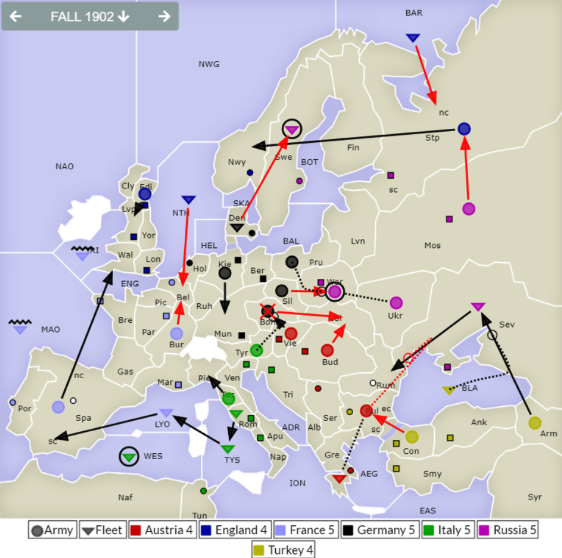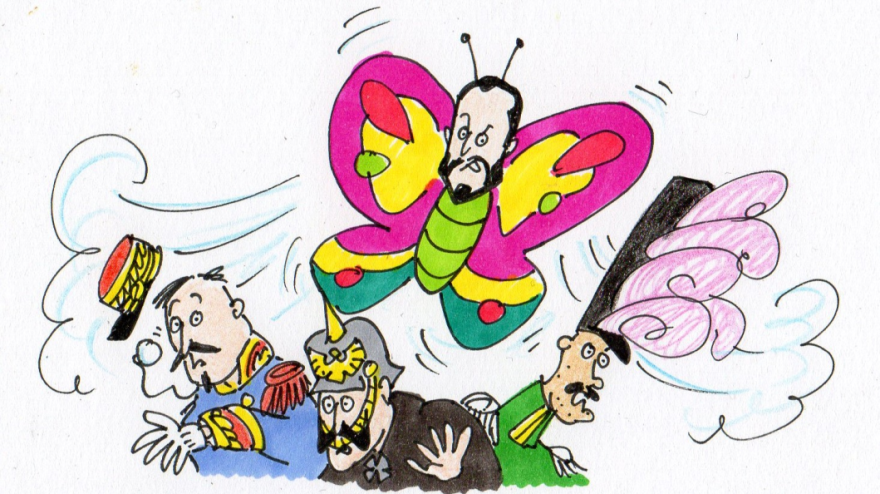“When Liam Neeson Plays Diplomacy”
A Butterfly Flaps His Wings and Umble Wins a Championship
Umble won Weaselmoot XV, meaning he got to write his own Champion’s Corner post in Diplomacy Briefing in the September 10, 2021, issue.
Early this year, we came up with a new strategy feature for the Briefing called “Second Fiddle.” The main motivation was that we noticed that the “Champions Corner” at times seemed repetitive, and we figured that giving those who came in second a chance to write would spice up the tournament recaps. We were not wrong, and some of our most entertaining articles have been from those that came oh so close.
I understand the difficulty though of writing a Champions Corner because it’s hard to identify exactly why you won. Even if you can identify some reasons, you often are not saying much that is new or interesting. Were my tactics just a little sharper? Was my diplomacy just a little more appealing? Or, did a swarm of butterflies flap their wings in the Amazon and cause Tommy to order his army to Norway and allow me to bounce his fleet and keep St. Petersburg in Fall 1902? Hard to say.
My first online tournament was the 2013 Winterblitz that I lost by .6 points. My first f2f tournament was the Weasels’ own 2013 CodCon where I got 3rd place. I remember driving home from that tournament at peace with shutting down my Diplomacy “career.” I’d established to myself that I could hang with some of the best in the game and that was enough for me. I got back in the game though five years later when I moved to a city that was trying to start up a club.
These last 3 years have been a steady repeat of close finishes without a crown. This season was going to be an especially tough one to win because my schedule was not going to allow me to legitimately compete for any tournament. I could occasionally play a game but minus a solo it wasn’t happening. I had a chance though when the Weasels decided to run their tournament on a Saturday and not have a top board.
There’s not much to say about my board top as England that I haven’t already said in my Legendary Tactics interview, though the personal fireworks that came out of my stab is recounted as only Ed Sullivan can in his article. My second game was a mad scramble that began with me getting attacked by everyone and ended with me moving ahead by one center in the last game year. If you’re interested in the play-by-play you can check out the Diplomats’ episode or DBN’s analysis.
So what’s there to talk about? We’re 400 plus words in and I’ve said basically nothing that will win someone a tournament. My stab at doing so is to talk about my philosophy of competition, Diplomacy’s ethos, and also make some comments about the state of virtual play.
I was forged in a crucible of competition. I have two brothers that are close in age and a dad that never let me win at anything. When we play board games I’d say we all want to win, but the truth is we all hate to lose to each other. As you can imagine, there were resignations of Monopoly games and gangs up on yours truly. Just a year ago, I remember my dad being excited when I landed on a built up property...he was already out of the game.
Now, don’t think that my family is a bunch of cutthroat rivals who can't stand each other, far from it. We just all have the spirit of competition and are able to keep the game within the game, or at the very least not hold grudges for too long.
When I first discovered Diplomacy in college, I knew I would love this game before I ever made my first move. It’s endlessly challenging and brings together a group of relentlessly competitive players that I feel at home with. Coincidentally, some occasionally root against me when they’re out.
Besides my family and all of you, I dial back my competitive board game side significantly because quite frankly...most people don’t enjoy this level of intense competition or don’t possess the very particular set of skills to play Diplomacy well.
Next, the ethos of a well-played Diplomacy game has been defined by the game’s creator. Allan Calhamer talked many times about how he envisioned a game where there would be a constant realignment to keep someone from running away with the game. To make this happen would require lots of...diplomacy, and a strong desire to win. Now of course no one has to listen to anyone on how to play a game, I’d like to argue though that striving to play your best game each game is needed for growth as a player and sustained health in the hobby.
There are some players who can only have a good game if they keep a game-long alliance. If they don’t get an ally right away they flame out because they never learned how to scramble or motivate others to work with them. These players have very uneven results and you can usually tell right away if they are going to have a good or bad game by who is on the board.
Some of these players unfortunately also tend to be the most vengeful and obnoxious since their games are always a test of friendship. They introduce a lot of petty insults and grudges into the hobby that quite frankly make games unpleasant. The only thing I can say to this is that if you use a board game to determine if you like or don’t like someone, that says more about you than anything.
On a more constructive note, no one will get especially better if they always ally with “the safe choice." Learning how to develop workable alliances regardless of personalities is a skill that is needed for consistent success in this game and is absolutely vital in high-level play. On top of that, always allying with the same group of friends will limit your results and often times will give the board top to someone else because you didn’t pay attention to the dynamics of the board.
I have many times explained to someone while hugging it out that I moved against them because of what was happening on the other side of the board. That’s tough to hear of course, but I think players understand this. I personally can take a loss in good stride if everyone is playing to win.
Now, I’m not arguing that reputation should not be considered in Diplomacy. It most certainly should. How you conduct yourself on and off the board will always greatly determine the early game. I also get that often times friends will naturally want to ally together. What I’m speaking to though are those moments that come in a game when alliance shifts have to happen to keep you in contention.
This does not always happen of course. Sometimes you are so besieged that attacking your ally will only net someone else the board top. I definitely understand someone saying I’m not going to attack my ally because it only really benefits someone else. The ability to see that far ahead is evidence of a strong player, not a weak one.
The real issue is people who purposefully limit their own potential for meta reasons, personal vendettas, or cliquish play. Thankfully, I don’t think there are scores of people who do that which is why I still enjoy virtual play.
Now you may think that this article is blatantly self-serving and that by encouraging balance-of-power play that I am directly helping myself. You would be right. But, I also think this is the type of play that historically keeps the hobby healthy and welcoming to newcomers. The fact that this may mean I’ll win another tournament in 13 years could only be the smallest of bonuses.




